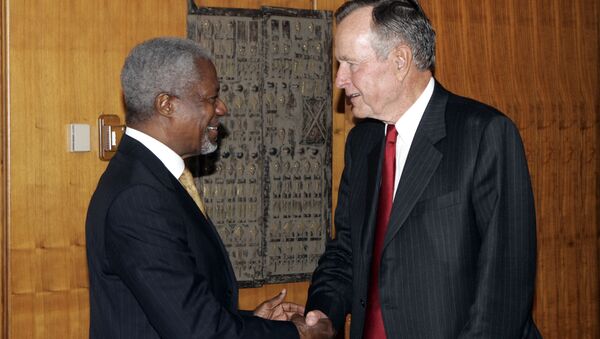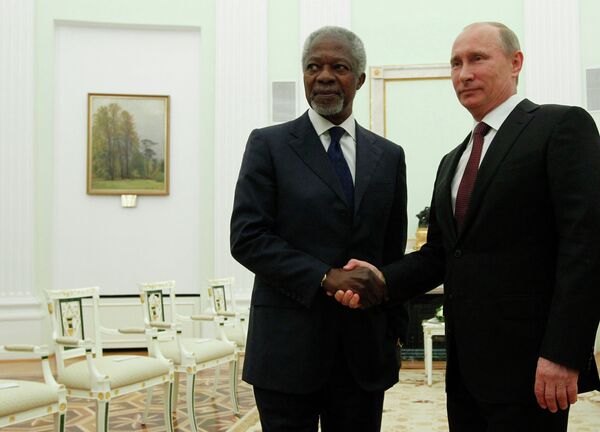With only a few hours remaining of 2018 it is time to look back at all the famous names and faces who died in 2018, some of whom triggered an outpouring of gushing tributes and others — like serial killer Dennis Nilsen — were greeted with glee or contempt.
George H W Bush
The Bush family was the most powerful US political dynasty since the Kennedys and George Herbert Walker Bush was the man who first parked the family bus at the White House.
Bush was Ronald Reagan's low-key Vice President from 1981 to 1988 and was the 41st President of the United States from 1989 to 1993.
Because his son, George W Bush, became the 43rd President in January 2001 the elder George was nicknamed "41" within the family.
"The entire Bush family is deeply grateful for 41's life and love, for the compassion of those who have cared and prayed for Dad, and for the condolences of our friends and fellow citizens," the family said in a statement on their website after the elder Bush died earlier this month, aged 94.
His wife Barbara, the former First Lady, had passed away in April and the elder Bush died in November.
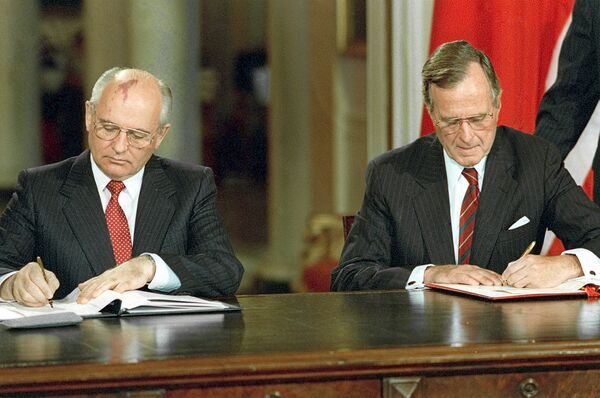
Bush was originally a businessman, who made his money in the Texas oil fields, and after spells as a Congressman and as US ambassador to the United Nations, he became head of the CIA in 1976, and was prominent in giving the agency's support to right-wing dictatorships in Latin America, including the junta who took over Argentina and proceeded with a Dirty War against left-wing journalists and activists.
One of George's others sons, Jeb, was Governor of Florida for many years but was forced to bow out of the race for the Republican presidential nomination in 2016, as he trailed Donald Trump.
The Bush family reportedly loathe Trump and there were reports the 45th president would not be invited to the funeral, which would be a huge snub, but eventually they relented.
Winnie Mandela
In April, Winnie Madikizela-Mandela died in a Johannesburg hospital, aged 81, after a long illness.
She was best known as the wife of Nelson Mandela for 38 years, 27 of which he was in prison.
In his autobiography, Long Walk to Freedom, Mandela described first setting eyes on her outside Baragwanath Hospital in Johannesburg, where she worked as a nurse, in 1957.
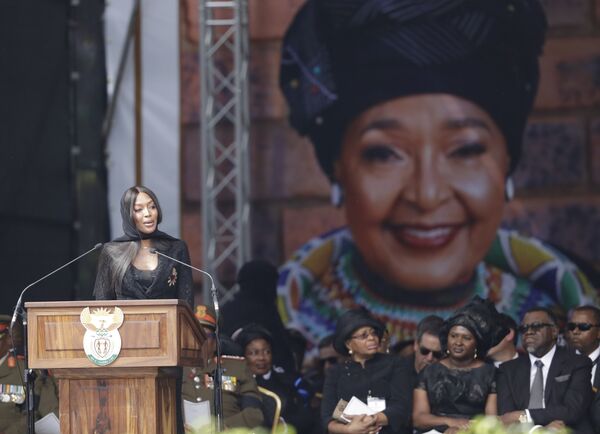
"I noticed out of the corner of my eye a lovely young woman waiting for the bus. I was struck by her beauty and I turned my head to get a better look at her, but my car had gone by too fast. This woman's face stayed with me," wrote Mandela, who bumped her into her again by chance a few weeks later.
They married in 1958 and had two daughters but in 1964 he was jailed for life and spent the next 27 years behind bars, 18 of them on Robben Island.
In 1990 Mandela was finally released but by then Winnie was a very different woman and her reputation was badly tarnished.
She had been unfaithful to Nelson while he was in prison and they later divorced.
In 1991 Winnie was acquitted of ordering the murder of a 14-year-old boy Stompie Seipei in Soweto, but was found guilty of kidnapping him. The trial heard she was linked to 15 killings by her followers, the so-called Mandela United football team.
In 2003 she was jailed for five years for a series of frauds.
The court heard she had exploited her position as head of the African National Congress's women's league to defraud a bank and dozens of ordinary people.
Despite all that she was elected as an MP for the ruling ANC in 2009 and retained the seat until her death.
Kofi Annan
Kofi Annan, who was the seventh UN Secretary-General, was well-respected and well-meaning but overall his time in command of the United Nations has to go down as a failure.
Born into an aristocratic family in Ghana in 1938, Annan earned a degree in economics at a US college, studied international relations in Switzerland and management at MIT.
He worked his way up through the UN bureaucracy and was in charge of UN peacekeeping efforts between 1992 and 1996 and was therefore directly responsible for the UN's inept response to the 1994 Rwanda genocide, which left around 800,000 Tutsis and moderate Hutus dead.
Despite that he still became UN Secretary-General in 1997, largely because he had the backing of the United States.
But in 2003 he condemned the US-led war in Iraq, saying it violated the UN Charter. "I have indicated it was not in conformity with the UN Charter. From our point of view and from the charter's point of view it was illegal," he stressed.
One of his biggest disappointments was the failure of the so-called Annan Plan, which sought to reunify Cyprus.
Annan led negotiations which led to a deal in 2004 but although it was approved by the Turkish Cypriots, a referendum led to a No vote among Greek Cypriots and the island has remained divided ever since.
In 2005 he proposed expanding the UN Security Council from 15 to 24 countries, either adding six new non-veto-holding permanent members or creating a new tier of semi-permanent members, but the plan was not put into practice and he left office the following year.
He died in August, aged 80.
Burt Reynolds
Burt Reynolds, who died in September at the age of 82, was one of the most successful Hollywood actors of the 1970s and 80s but he turned down the role of Han Solo in Star Wars and also snubbed an offer to become James Bond.
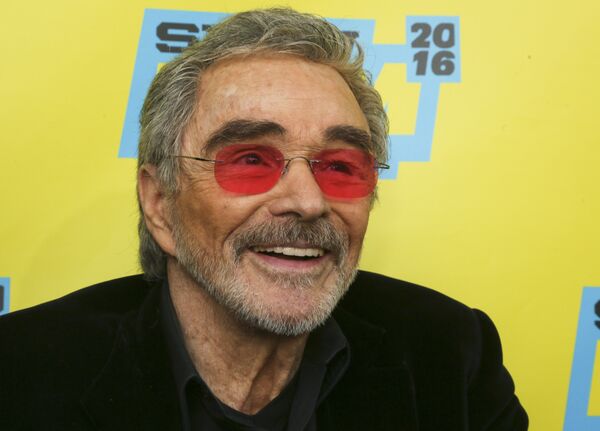
Reynolds was best known for his role as the bandit in the 1977 action comedy "Smokey and the Bandit." He also starred in the 1972 thriller "Deliverance," his breakout film role, and the 1981 comedy "The Cannonball Run." He was also nominated for an academy award for his role as Jack Horner, an adult film director in "Boogie Nights" (1997).
He was filming a small role in Quentin Tarantino's movie about the Charles Manson murders, Once Upon A Time in Hollywood, when he died.
Kim Porter
Kim Porter, a former model and ex-girlfriend of rap star P Diddy, died suddenly at her home in Los Angeles on November 15, aged 47.
Her funeral in her home town of Columbus, Georgia was attended by a string of US celeberities, including Mary J Blige, Usher, Lil' Kim, DJ Khaled, Kimora Lee Simmons, Mase, Yolanda Adams, and Kandi Burruss.
P Diddy — real name Sean Combs — gave an emotional eulogy.
"I didn't really understand like how to love. We went through some circumstances, my mother and family, where it's like we didn't have a big family like that, but she really just started breaking down the exterior of any shell I put up," he told the guests.
John McCain
One year after his diagnosis of brain cancer, US Senator for Arizona John McCain passed away at the age of 81.
McCain, who came from a military family, started out as a naval aviator and in 1967 he was shot down while involved in Operation Rolling Thunder, the three-year US bombing campaign against Vietnam.
He was subjected to severe torture by the North Vietnamese and would remain a prisoner until 1973, when he was released with almost 600 other POWs as a result of the Paris Peace Accords.
McCain retired from the Navy at the rank of captain in 1981 after 23 years of service and entered politics, becoming a Republican representative from Arizona's First District.
A self-described Reagan Republican, McCain typically voted in lockstep with the conservative president: he favored prayers in school, opposed abortion, and supported US military action in Central America in places like Grenada and US aid for the anti-communist Contra rebels in Nicaragua.
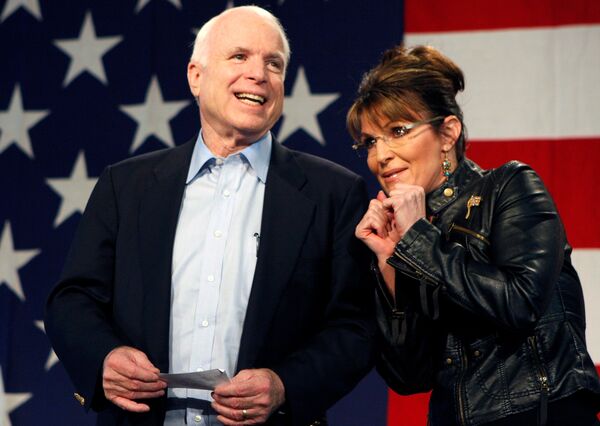
On April 25, 2007, 71-year-old McCain announced he was running for president again. Despite being the most visible of all Republicans, his campaign was beset by difficulties due to his support for unpopular immigration policies. He had some success with town hall meetings and became an early adopter of social media for political purpose, with accounts on Facebook, Myspace, and YouTube.
McCain lost to Barack Obama, who ran a platform that appealed to younger voters and women, compared to the more traditional McCain, whose choice of Sarah Palin as his running mate was ill-advised.
McCain was a fierce opponent of Donald Trump and clashed repeatedly with him during the 2016 election campaign.
"My deepest sympathies and respect go out to the family of Senator John McCain. Our hearts and prayers are with you!" Trump tweeted after McCain's death.
Paddy Ashdown
The former leader of Britain's third biggest political party, the Liberal Democrats, Paddy Ashdown, died this month, aged 77, after a battle with bladder cancer.
The Lib Dems' leader Sir Vince Cable, said Lord Ashdown — who led the party between 1988 and 1999 — had "made a real mark".
Former prime minister Tony Blair said Ashdown had been "a political visionary and leader".
Prior to entering Parliament in 1983, he served in the Royal Marines and in the British intelligence services.
After standing down as MP for Yeovil in 2001, he served as the United Nations' high representative in Bosnia-Herzegovina.
Stephen Hawking
Hawking, who died in March aged 76, was an English theoretical physicist, cosmologist, author and Director of Research at the Centre for Theoretical Cosmology within the University of Cambridge. His scientific works include a collaboration with Roger Penrose on gravitational singularity theorems in the framework of general relativity and the theoretical prediction that black holes emit radiation, often called Hawking radiation.
Hawking was the first to set out a theory of cosmology explained by a union of the general theory of relativity and quantum mechanics. He is a vigorous supporter of the many-worlds interpretation of quantum mechanics.
Hawking had a rare early-onset, slow-progressing form of amyotrophic lateral sclerosis (ALS) that gradually paralysed him over the decades. Hawking surprised doctors around the world, as he lived on despite the disease, which usually leads to death within years.
The ALS gradually disabled Hawking's body, forcing him to use a wheelchair and his trademark voice synthesizer, which he controlled using his cheek's movement.
Despite being paralysed, Hawking continued to do science, speak before audience and write books that popularized science among a wide audience. He also had a phenomenal sense of humour and played himself in several episodes of The Simpsons.
Hawking was portrayed, in his youth, by Eddie Redmayne in the 2014 film The Theory of Everything.
Dennis Nilsen
Dennis Nilsen, who died in prison in May aged 72, was serving a life sentence for murdering at least 12 men during the late 1970s and early 1980s.
Nilsen, who died in Full Sutton prison in Yorkshire, was born in Scotland but was working in a Job Centre in London when he was arrested by police after the dismembered remains of one of his victims began clogging the drains at his apartment in Muswell Hill, north London.
He lured homosexual and homeless men back to his flat after meeting them in gay bars or on public transport, offering them sex, alcohol or both.
Nilsen strangled his victims and kept their corpses in his bed for long periods of time, before eventually forced to dispose of them because of the smell.
Brian Masters wrote a book about Nilsen — Killing For Company — the title of which hinted at the serial killer's motivation, which was similar to that of US serial killer Jeffrey Dahmer.
Cyrille Regis
Former England footballer Cyrille Regis died in January, aged just 59.
He scored 112 goals in 297 appearances for West Bromwich Albion — then one of the top teams in England — before joining Coventry City for £250,000 in 1984.
Regis, a powerfully built striker who was actually born in French Guiana, was a pioneer for black footballers in the game when he played alongside Laurie Cunningham and Brendon Batson at The Hawthorns.
Regis, Cunningham and Batson were nicknamed The Three Degrees — after a famous UK pop group — by Ron Atkinson, before he moved on to Manchester United, a statue of the trio is due to be unveiled in the spring.
"He was a beautiful man and a wonderful husband, father, grandfather, brother and uncle," said his widow, Julia,
Lyudmila Alexeyeva
Lyudmila Alexeyeva, who died in Moscow earlier this month aged 91, was a prominent Soviet and Russian rights activist.
Russian President Vladimir Putin expressed deepest condolences
"The president highly appreciated Lyudmila Alexeyeva's contribution to forming the Russian civil society, and highly respected her principled stance on many issues," Kremlin spokesman Dmitry Peskov said.
Alexeyeva was born in Crimea and raised in the Soviet Union under Stalin.
She became a vocal dissident of Soviet human rights abuses when Nikita Khrushchev loosened censorship restrictions in the wake of Stalin's death.
Later, under Brezhnev, she worked on the Chronicle of Current Events, an underground journal which documented human rights abuses in the Soviet Union.
In 1976 she co-founded the Moscow Helsinki Group to monitor the Soviet Union's compliance with the human-rights provisions of the Helsinki Accords.
Soviet authorities forced the group to disband less than a year later and sent Alexeyeva into exile. She lived in the United States for 16 years but in the early 1990s she returned to Russia and was visited on her 90th birthday by President Putin.

